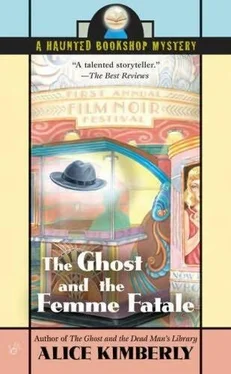Alice Kimberley - The Ghost and the Femme Fatale
Здесь есть возможность читать онлайн «Alice Kimberley - The Ghost and the Femme Fatale» весь текст электронной книги совершенно бесплатно (целиком полную версию без сокращений). В некоторых случаях можно слушать аудио, скачать через торрент в формате fb2 и присутствует краткое содержание. Жанр: Детектив, на английском языке. Описание произведения, (предисловие) а так же отзывы посетителей доступны на портале библиотеки ЛибКат.
- Название:The Ghost and the Femme Fatale
- Автор:
- Жанр:
- Год:неизвестен
- ISBN:нет данных
- Рейтинг книги:5 / 5. Голосов: 1
-
Избранное:Добавить в избранное
- Отзывы:
-
Ваша оценка:
- 100
- 1
- 2
- 3
- 4
- 5
The Ghost and the Femme Fatale: краткое содержание, описание и аннотация
Предлагаем к чтению аннотацию, описание, краткое содержание или предисловие (зависит от того, что написал сам автор книги «The Ghost and the Femme Fatale»). Если вы не нашли необходимую информацию о книге — напишите в комментариях, мы постараемся отыскать её.
The Ghost and the Femme Fatale — читать онлайн бесплатно полную книгу (весь текст) целиком
Ниже представлен текст книги, разбитый по страницам. Система сохранения места последней прочитанной страницы, позволяет с удобством читать онлайн бесплатно книгу «The Ghost and the Femme Fatale», без необходимости каждый раз заново искать на чём Вы остановились. Поставьте закладку, и сможете в любой момент перейти на страницу, на которой закончили чтение.
Интервал:
Закладка:
I gave Sadie a heads-up, grabbed my purse from behind the sales counter, and hurried back to Brainert, who quickly scanned the room. "No sign of Seymour," he said, and started for the door.
"Wait! I'm sure he's around. He was helping me with Hedda's signing, but we're all through with that now, so he's probably changing out of his uniform-"
"No, no, Pen. You misunderstand," Brainert whispered conspiratorially. " Seymour 's absence is a good thing. We don't need him fawning over Pierce Armstrong while we try to interview the man, or poking fun at Dr. Pepper's good name and embarrassing us both."
Suddenly a large arm snaked around Brainert's neck and a beefy hand mussed his neatly combed hair.
"That's what I love about you, Brainiac," Seymour said. "Always a stickler for etiquette."
Brainert quickly extricated himself from his friend's bear hug and smoothed down his neatly cut brown hair. He whirled to face Seymour and gasped.
"What's the matter?" Seymour said, arms wide. "I told you I was going to change into civilian clothes."
Seymour 's large T-shirt sported a vintage Mighty Mouse flying over a cartoon skyline, tiny cape fluttering in the breeze. His hairy legs stuck out of khaki shorts that ended just above his dimpled knees. Size-twelve feet were tucked into clogs, which he wore sans socks.
Brainert groaned. "How old are you?"
"Old enough," Seymour replied.
"Except for your lack of a baseball hat-worn backward, of course-you could pass for one of my college students' younger siblings."
Seymour reached back, yanked a ragged Red Sox cap out of his back pocket, and donned it backward.
"Let's go," he said. "I can't wait to meet Pierce Armstrong."
Larchmont Avenue was a quiet, shady boulevard at the top of a picturesque hill on the edge of town. The homes were large three- and four-story structures surrounded by expansive lawns and lush topiaries. Each house was unique. Many had flagstone paths, balconies, even widow's walks circling their roofs. The oaks, elm, maple, and chestnut trees that dotted the lawns and hugged the walls of the homes were well over a century old. And no home here was built later than the 1920s. That was about the last time most people in our little town of Quindicott had been able to afford a new house as large as these.
The dean of St. Francis's School of Communications lived here, too, in a sprawling three-story building of sand-colored stone, red roof tiles, arched windows, and wrought-iron balconies.
On the drive over, Brainert had explained that the dean's large house was a repository for his lifelong interest in certain collectibles.
"It's practically a museum dedicated to Hollywood of the 1940s through the '70s, chiefly related to film noir. I'm sure you'll both be impressed. It's a superb collection. The Smithsonian has expressed interest in obtaining certain pieces after his death."
Brainert parked at the curb. He tried his colleague's home phone one more time, but only connected with the answering machine.
With a sigh, he closed his cell phone. "Let's go."
We followed a winding stone path through a manicured lawn trimmed in dark green shrubs and bright red tulips. At the large front porch, we paused in front of the door.
"I hope someone's here," Brainert said as he rang the bell.
I heard movement in the house on the second ring. The lock clicked and to my surprise screenwriter and novelist Maggie Kline opened the door.
"Parker! What a surprise!" Laugh lines creased the edges of her eyes as she gave him a big smile. She adjusted her red-framed glasses and put a hand on the hip of her low-waisted khakis. "And you brought friends, I see. Is this a party? Did Wendell invite you over? Come on in."
We entered a high-roofed foyer with bright yellow walls and a slowly rotating ceiling fan. The space was dominated by a huge framed poster for the film Taxi Driver. The central image of Robert De Niro as Travis Bickle was framed by a yellow border, which matched the walls. Below it was a glass case, displaying a pistol rigged on some kind of sliding rail-a prop from one of the movie's scenes, I assumed.
"The man in the Mighty Mouse shirt is Seymour Tarnish," Brainert told Maggie. " Seymour is our local mailman, and a big fan of Pierce Armstrong's."
"Oh, I see. You came to pay him a visit. I'm so sorry, he's not here. Wendell just took Pierce over to the Movie Town Theater for his first talk of the weekend."
Brainert sighed. "I'm sorry we missed him, too. I called several times but-"
"Uh-oh, my bad. I've been ignoring the phone. This is kind of embarrassing, but…" Maggie made a pained face. "Wendell's ex-wife has been calling and calling. I didn't want to complicate matters by picking up the phone again and getting into a conversation with the woman about who I am and why I'm staying with Wendell. We had one brief, unhappy conversation, and frankly I don't care to go through a repeat performance. But let's not dwell on that. Come in! Come in!"
Maggie led us into the living room. Here the bone-white walls were lined with three-foot-tall posters, framed under protective glass. On one wall, Humphrey Bogart was facing off with Mary Astor in The Maltese Falcon; Fred MacMurray was passionately kissing Barbara Stanwyck in Double Indemnity, the words You can't kiss away a murder! emblazoned across their clinched bodies; and Veronica Lake 's stunning image smoldered away in This Gun for Hire-her first film with Alan Ladd, who was destined to become her leading man in the classic noirs The Blue Dahlia and The Glass Key.
I walked the length of the room, taking in more legendary images: the ravishing, raven-haired Faith Domergue clutching a gun as sleepy-eyed Robert Mitchum grabbed for her in Where Danger Lives; Robert Montgomery's finger squeezing a trigger in The Lady in the Lake; trench-coated cop Dana Andrews appearing completely smitten with the bewitching Gene Tierney in Laura; and Bogart facing off with yet another woman, this time his legendary lady love, Lauren Bacall, in The Big Sleep.
"Wow," I said. "These old movie posters are absolutely amazing."
"They're actually called one-sheets," Maggie said. "One-sheets?"
"That's right." Maggie pointed to the faintest traces of creasing in the Double Indemnity poster. "Until the 1960s, one-sheet posters were printed on uncoated paper and folded into rectangles for shipping. That's why it's so hard to get them in good condition. Wendell's done a magnificent job preserving these."
A few of the framed one-sheets were surrounded by smaller posters, displaying entirely different scenes from the films. "And what are these called?" I asked, pointing to the smaller posters.
"Oh, those aren't posters. Those are lobby cards," Maggie informed me. "They're printed on heavy cardstock instead of paper, and they were usually sent by the studios in sets of eight. Theater owners placed them in the lobby-hence the name. They were very similar to window cards."
"Okay," I said, "you got me again. What exactly are window cards?"
Maggie gestured to a 14-by-22 inch card advertising the 1945 film Detour. "Window cards were printed on heavy cardstock, too. You can tell the difference between a window card and a lobby card by this blank strip at the top of the card. See?" She pointed to the top of the card. "The local theater would use that space to write its name. In this case, it was the Empire, in New York City."
Waddya know, my old haunt, said Jack, obviously amused. Of course, back then I charged a per diem for my haunting. 'Cause I wasn't dead yet.
"Oh, Jack… " I privately groaned. "That is so bad… "
"So, Maggie," Brainert spoke up, "you and Pierce are both staying here?"
Maggie nodded. "This house is large enough to put up five guests, let alone two, but I guess you know that."
Читать дальшеИнтервал:
Закладка:
Похожие книги на «The Ghost and the Femme Fatale»
Представляем Вашему вниманию похожие книги на «The Ghost and the Femme Fatale» списком для выбора. Мы отобрали схожую по названию и смыслу литературу в надежде предоставить читателям больше вариантов отыскать новые, интересные, ещё непрочитанные произведения.
Обсуждение, отзывы о книге «The Ghost and the Femme Fatale» и просто собственные мнения читателей. Оставьте ваши комментарии, напишите, что Вы думаете о произведении, его смысле или главных героях. Укажите что конкретно понравилось, а что нет, и почему Вы так считаете.












